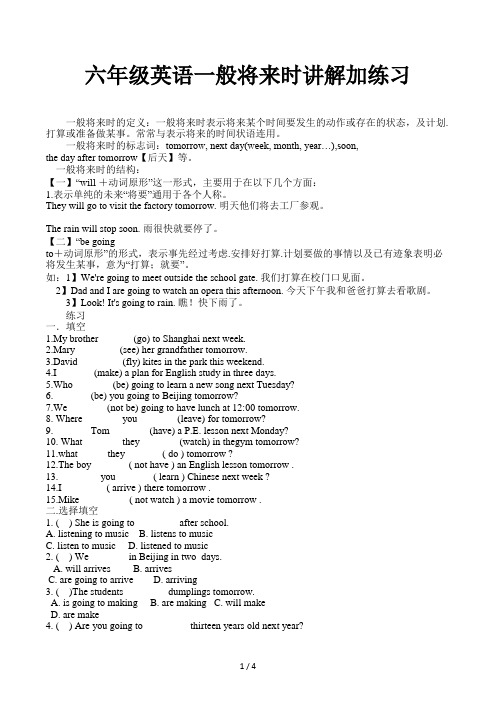广州六年级下U4语法 一般将来时
时态之一般将来时(课件)人教PEP版英语六年级下册

there be句型遇上一般将来时
(1)含be going to的there be句型 其结构是“There be going to be+主语+其他.”,意为“将会有……”, 其中to后的be是there be句式中的be,不能用have()。
今晚将会有一场英文电影。 There is going to have an English film this evening. () There is going to be an English film this evening. ()
2. 时间标志词:
3.基本结构: be going to+动词原形 will +动词原形
the day after tomorrow(后天) tonight(今晚)
this evening(今天晚上), this afternoon(今天下午)
tomorrow(明天),
tomorrow+时间
next+时间 下一个……
小熊同学
对划线部分提问技巧四步曲:一变二代三换四抄 1. 将句子变为一般疑问句 2. 找特殊疑问词代替划线部分(若划线部分是动词,则要加上do/doing) 3. 把特殊疑问词换到句首 4. 其它部分抄下来
1. I am going to draw pictures with Tom next week.(对划线部分提问) ________ are you _________ __________ _________ with Jack?
He will visit his grandparents next weekend.
明天我打算去打篮球。
I will play basketball tomorrow.
一般将来时的知识点六年级

一般将来时的知识点六年级知识是静态的,人有了知识,还应该明白如何正确地将所掌握的知识在实践中加以应用,没有智慧,充其量不过是一本记载着知识的书。
下面小编给大家分享一些一般将来时的知识点归纳六年级,希望能够帮助大家,欢迎阅读!一般将来时的知识六年级1.shall用于第一人称,常被will 所代替。
will 在陈述句中用于各人称,在征求意见时常用于第二人称。
Which paragraph shall I read first? 我先读哪一段呢?Will you be at home at seven this evening? 今晚七点回家好吗?2. be going to +不定式,表示将来。
a. 主语的意图,即将做某事。
What are you going to do tomorrow? 明天打算作什么呢?b. 计划或安排要发生的事。
The play is going to be produced next month。
这出戏下月开播。
c. 有迹象要发生的事。
Look at the dark clouds, there is going to be a storm. 看那乌云,快要下雨了。
3.be +不定式表将来,按计划或正式安排将发生的事。
We are to discuss the report next Saturday. 我们下星期六讨论这份报告。
4.be about to +不定式,意为马上做某事。
He is about to leave for Beijing. 他马上要去北京。
注意:be about to do 不能与tomorrow, next week 等表示明确将来时的时间状语连用。
5.一般现在时表将来。
a. 下列动词come,go,arrive,leave,start,begin,return 的一般现在时可以表示将来,主要用来表示在时间上已确定或安排好的事情。
The train leaves at six tomorrow morning. 火车明天上午六点开。
六年级英语一般将来时讲解加练习

六年级英语一般将来时讲解加练习一般将来时的定义:一般将来时表示将来某个时间要发生的动作或存在的状态,及计划.打算或准备做某事。
常常与表示将来的时间状语连用。
一般将来时的标志词:tomorrow, next day(week, month, year…),soon,the day after tomorrow【后天】等。
一般将来时的结构:【一】“will +动词原形”这一形式,主要用于在以下几个方面:1.表示单纯的未来“将要”通用于各个人称。
They will go to visit the factory tomorrow. 明天他们将去工厂参观。
The rain will stop soon. 雨很快就要停了。
【二】“be goingto+动词原形”的形式,表示事先经过考虑.安排好打算.计划要做的事情以及已有迹象表明必将发生某事,意为“打算;就要”。
如:1】We're going to meet outside the school gate. 我们打算在校门口见面。
2】Dad and I are going to watch an opera this afternoon. 今天下午我和爸爸打算去看歌剧。
3】Look! It's going to rain. 瞧!快下雨了。
练习一.填空1.My brother ______ (go) to Shanghai next week.2.Mary ________ (see) her grandfather tomorrow.3.David ________ (fly) kites in the park this weekend.4.I_______ (make) a plan for English study in three days.5.Who _______ (be) going to learn a new song next Tuesday?6._______ (be) you going to Beijing tomorrow?7.We _______ (not be) going to have lunch at 12:00 tomorrow.8. Where _______ you _______ (leave) for tomorrow?9._______ Tom _______ (have) a P.E. lesson next Monday?10. What _______ they _______ (watch) in thegym tomorrow?11.what _____ they _______( do ) tomorrow ?12.The boy _______( not have ) an English lesson tomorrow .13.________ you _______( learn ) Chinese next week ?14.I ________ ( arrive ) there tomorrow .15.Mike _________ ( not watch ) a movie tomorrow .二.选择填空1. ( ) She is going to ________ after school.A. listening to musicB. listens to musicC. listen to musicD. listened to music2. ( ) We _______ in Beijing in two days.A. will arrivesB. arrivesC. are going to arriveD. arriving3. ( )The students ________ dumplings tomorrow.A. is going to makingB. are makingC. will makeD. are make4. ( ) Are you going to_________ thirteen years old next year?A. will beB. areC. beD. go5. ( ) ___will see a play in 5 days?A. WhenB. WhatC. WhoD. Whose6. ( ) Mary______ English next year.A. will learnB. will to learnC. are going to learn.D. learns7. ( ) He’ll _____ shopping this afternoon.A. goingB. goC. goesD. went8. ( ) Will you ____ at the bus stop at 10:30?A. meetingB. meetsC. meetD. met9. ( ) Lily and I _______ the guitar. next week.A. am going to playB. are going to playC. will playsD. play10. ( ) How ______ Jenny ___ home tomorrow?A. does......goB. is……goingC. will……goD. do……g o11. ( ) Who is going to _________ a song ?A. sings B singing C. to sing D. sing12. ( ) I _________in Beijing in three days.A. are going to arriveB. arriveC. will arriveD. arrives13. ( ) He _______some model planes tomorrow .A. going to makeB. is makingC. will make D makes14. ( ) Are you going to ___________a doctor next year ?A. will beB.. areC. beD. are going to15. ( ) She ________ you make supper this evening .A. helpsB. will helpC. is helpingD. is going help三.把下列句子变成一般疑问句,并给出肯定和否定回答。
一般将来时(讲义)人教PEP版英语六年级下册

英语学科辅导讲义
一般将来时
1.一般将来时的定义:表示将来某一时刻的动作或状态,或将来某一段时间内经常的动作或状态
2.时间标志词:
1)tomorrow, the day after tomorrow, tomorrow morning/afternoon/evening
2)next year/week/month/hour/day/century the year after next(后年)
3)in+一段时间(★★★★★)
4)in the future
5)this afternoon/Sunday/evening
6)from now on
7)one day, someday (未来的)某天
8 )soon (★★★★★)
3.结构
主语+shall/will+ do+其他(shall用于第一人称I/we)客观上将要
主语+be going to do 人作主语,打算做某事、推测天气
主语+ be going to + do+其他
这种结构常用来表达事先考虑过打算要做的事以及已有迹象表明必将要发生的某事,意为“打算;就要”。
注意:be 动词要与主语的人称和数一致
如:I am going to read some books tomorrow.
Look! It's going to rain.
★使用be going to 结构应注意的两点
There be 句型的be going to 结构为:There is going to be... (注意句型中going to 后面的be 不能改为。
广州版小学六年级英语一般将来时

3.How will you go on your holiday?
___________________________________________________________
A. do B. am doing C. am going to do
()2. He often ___________ to school with his friend.
A. go B. goes C. going
()3. Will you ___________ noodles for breakfast tomorrow morning?
构成:
(物(第(1)第一人称:I / we) + shall+动词原形,例如:
We / I shall go to park next day.
否定形式:+shall not +动词原形,例如:
We / Ishall not go to parknext day.
提问:Shall…+动词原形…?,例如:
11. _______ you _______ (visit) the museum next Thursday?
No, I______________.
12. I___________ ________(understand) the book next week. Because I __________
9.I ____________________________________(学习)in the library one hour later.
通用版英语六年级下册一般将来时 课件 (共43张PPT)

tomorrow明天 tomorrow morning 明天早上 tomorrow afternoon 明天下午 tomorrow evening明天晚上 the day after tomorrow后天
next 系列
next time下次 next week下周 next month下个月 next summer/winter holida明年暑假/寒假 next year明年
B. going
C. goes
D. went
Summary
1.掌握一般将来时的定义 2.掌握一般将来时的结构 3.掌握一般将来时的时间标志词 4.掌握be going to+动原 和will+动原的区别 5.掌握一般将来时的句型转换 6.掌握一般将来时 的特殊用法
特殊疑问句 :特殊疑问词 + 一般疑问句?
1 I am going to swim tomorrow. What are you going to do tomorrow?
2 I am going to swim with my brother tomorrow. Who are you going to swim with tomorrow?
即学即练
4.He will paint it pink. (一般疑问句) Will he paint it pink?
5. There will be a sports meeting next week.(否定句) There will not be a sports meeting next week.
in+将来的年份(在…….年)
in+时间段 表示“m now on 从现在开始 in the future 在未来 in future 不久 before long不久之后 Soon 很快 Tonight在今晚 one day 有一天 some day某天 this afternoon/evening今天下午/晚上
小学英语六年级下册总复习《一般将来时 》课件

一般情况,一般将来时的对划线部分有三种 情况。 1. 问人。Who 例如:I’m going to New York soon. →Who’s going to New York soon. 2. 问干什么。What … do. 例如: My father is going to watch a race with me this afternoon. →What is your father going to do with you this afternoon. 3. 问什么时候。When. 例如:She’s going to go to bed at nine. →When is she going to bed?
一般疑问句
be或will提到句首,some改为any, and改为 or,第一二人称互换。 例如:We are going to go on an outing this weekend. → Are you going to go on an outing this weekend?
对划线部分提问
一般将来时
一般将来时的意义: 表示将要…..,将会做….,打算去做….. 如:它将要下雨了。 我打算去买一本书。 我们明天将会去中山公园。
提示动词
句中一般有以下时间状语:tomorrow, next day(week, month, year…),soon, the day after tomorrow(后天)
( B ) 8. – Will his parents go to see the movie tomorrow? – No, ________ (不去). A. they willn’t. B. they won’t. C. they aren’t. D. they don’t. ( B ) 9. We ________ the work this way next time. A. do B. will do C. going to do D. will doing
一般将来时(课件)人教PEP版英语六年级下册

变疑问很简单, will提到主语前, 变否定也不难, will后要把not添。
Example
Tomorrow will be April Fool’s Day. 明天是愚人节。
I will go to visit him next week.
下周我将去拜访他。
He will be twenty years old next year. 明年他就二十岁了。
5.— 明天她会去图书馆吗? — 不,她不会。 — __W__il_l _____ she go to the library tomorrow? — No, she _w__o_n_'_t ____.
一般将来时的用法:
时间标志
tomorrow 明天 soon 不久 next day 下一天 next week 下周 next month 下个月 next year 明年
未来发生事 I will go to the beach with my classmates next week. 下星期我要和同学去海滩。 They will have a picnic tomorrow. 他们明天要举行野餐。
It’s very cold. I think it is going to snow. 天气很冷,我想要下雪了。
I’m going to go fishing tomorrow. 我明天去钓鱼。
I’m going to tell you about it. 我打算告诉你这件事。
Tomorrow will be April Fool’s Day. 明天是愚人节。
一般 疑问句
难点解析
2. 表示时间、日程上所安排好 将要发生的事,用一般现在时。
School finishes on January 18th. 学期一月十八日结束。 The party starts at four thirty. 晚会四点半开始。
- 1、下载文档前请自行甄别文档内容的完整性,平台不提供额外的编辑、内容补充、找答案等附加服务。
- 2、"仅部分预览"的文档,不可在线预览部分如存在完整性等问题,可反馈申请退款(可完整预览的文档不适用该条件!)。
- 3、如文档侵犯您的权益,请联系客服反馈,我们会尽快为您处理(人工客服工作时间:9:00-18:30)。
重要语法:一般将来时概念:一般将来时:将要发生的事情或者计划要做的事情,用一般将来时。
一般将来时的句子中经常有表示将来时间的短语tomorrow, next year等。
一般将来时的构成:be going to +动词原形一般将来时的另一种结构:will +动词原形时态特征词: (tomorrow, tomorrow+时间, next+时间, next week, next month, next year)的作用,并在做题时发挥它们的作用。
如果没有特殊的要求,在使用将来时的时候,尽量用“will+动词原形”的结构形式。
标识词、特征词:tomorrow、 tomorrow +时间、next+时间、 next week、next month、next year、from now on(从现在开始)、soon、in the future、in 2015、 in two days(两天之后)【四种句式:】1.be going to +动词原形(1).肯定句主语+be(am /,is,/ are) going to +动词原形+其它My sister is going to learn English next year. 我姐姐准备明年学英语。
(2).否定句主语+be(am / is / are)not going to +动词原形 +其它I am not going to(go to)the cinema tonight. 我今天晚上不打算去看电影。
(3).一般疑问句 Be (am / is / are)+主语+going to+动词原型+其它?Is your father going to play basketball with you ?No , he isn’t.你父亲打算和你去打篮球吗?不。
(4).特殊疑问句特殊疑问词(Wh-)+一般疑问句 ?Where are you going to spend Spring Festival.? 春节你打算在哪过?2.will /shall +动词原形(在书面语中,主语是第一人称I, we时,常用shall)(1).肯定句主语+will/shall+动词原形+其它I (shall) write to him next week. 下周我将给他写信。
(2).否定句主语 + will /shall+ not + 动词原形 +其它They wo n’t watch TV this evening。
今天晚上他们不看电视。
(3).一般疑问句 will/shall+主语 +动词原形+其它Will you stay at home with us tomorrow ?明天你和我们呆在家里好吗?(4).特殊疑问句特殊疑问词(Wh-) +一般疑问句When will your father be back? 你爸爸什么时侯回来?注意:be或will提到句首,some改为any, and改为or,第一二人称互换。
【实战训练】一、用所给的动词的适当形式填空。
(每个空只填一个词)。
1. Tomorrow, my family______ _______(have) a picnic, We ________ _______ (go) to the park to _________(go) boating.2. ___________ you _________ _________ (free) the day after tomorrow?Yes, I___________.3. Our father___________(go) to work on foot every day. But he _________ ______ (go) to work by bike tomorrow.4. Listen, the children_______ _______ (sing) in the music room. And they ________ ________ (dance) next week.5. _________ you ________ ________ ________ (visit) the Great Wall next summer holiday? No, we _________. But we _________ ________ _________ ________( swim) in the swimming pool.6. ___________ the pupils __________(go) sightseeing next Sunday?Yes, they __________. They always ___________(go) sightseeing on Sunday.7. There___________ __________(be ) a party at our school tomorrow. And they_______(have) great fun, I think.8. It ______ _______(be) a fine day tomorrow.9. Tomorrow Miss Wang_________ ________ _________ _________(leave) for New Zealand. She ___________ ___________(go) there by plane. Look, she ________ __________(buy)something to___________(eat) there.10. Look at those workers. They___________ _________(plant) trees on the hill. Theday after tomorrow, they ___________ ___________ (plant) trees near the river.11. _______ you _______ (visit) the museum next Thursday? No, I_________.12. I___________ ________(understand) the book next week. Because I __________________(read ) it tomorrow.二、选择正确的选项。
() 1. I ___________ the housework tomorrow.A. doB. am doingC. am going to do() 2. He often ___________ to school with his friend.A. goB. goesC. going() 3. Will you _______ noodles for breakfast tomorrow morning? No, I won’t.A. haveB. hasC. having() 4. Is she going to work? Yes, ___________.A. she will.B. she is.C. she does.() 5. Tomorrow is Sunday, we ___________ a picnic.A. haveB. is havingC. will have() 6. Look, the girl ___________.A. danceB. is dancingC. will dance() 7. My friends ___________ in the pool this afternoon.A. are going to swimB. will swimsC. are swimming() 8. We are going to ___________.A. skateB. go skateC. going skating() 9. Tom and Jimmy ___________ together tonight.A. are going to playB. is going to playC. am going to play() 10. The students usually ___________ books in the morning.A. readingB. readC. will read【课后练习: 】一、单项选择( )1. The animal _______ a long nose is the elephant.A. andB. ofC. withD. for( )2. The animal has no place _______ live in.A. inB. onC. atD. to( )3. People buy things _______ from the animals.A. makingB. madeC. makesD. make in( )4. They are _______ danger now. We must do something to help them.A. inB. onC. atD. to( )5. There are some ________ in the tree.A. leafB. leafsC. leavesD. leaving( )6. If we don’t do something now, they may all ________.A. disappearingB. disappearsC. disappearD. disappeared( )7. Never _______ things made from animals in danger.A. buyB. buysC. to buyD. buying( )8. Plant trees and don’t _________ the earth.A. polluteB. pollutedC. pollutingD. to pollute二、根据中文意思,把下列句子补充完整。
1. Would you like to live in _________________________(一个没有水的世界)?2. Yesterday he ___________________________(吃了一顿大餐)in that restaurant.3. ____________________________(在教室里做作业)isn’t fun for the children.4. These animals will _________________________(永远消失).5. The bowl _____________________________(由草制成的).四、根据上下文,从方框内选择恰当的档次,把短文补充完整。
